NHL Study
Welcome
The goal of our study is to comprehensively examine brain health factors, including cognitive function, mental and behavioral function, genetics, and medical status in the context of each player's personal history.
We will use a variety of neurological measures to provide a comprehensive examination of brain health in athletes. Additionally, we will examine how other factors, such as player’s background, family history, mental health history, medical history, concussion and other injury history, brain function and structure, and genetics contribute to brain health during aging. This research is being carried out at the Rotman Research Institute at Baycrest with the support of the National Hockey League Alumni and University of Toronto Alumni Associations.
The question of the long term implications of repetitive injury in professional athletes has been at the forefront in the media. We recognize that there are many questions concerning brain health in both professional and non-professional athletes, and as such, are seeking to provide a thorough and comprehensive evaluation of brain health using the best techniques and practices available in the medical community today. For description of our scientific approach from lead investigator Dr. Brian Levine, see his interview on this topic in the Globe and Mail.
The research will be held to the highest standards in ethics. As such, all procedures that will be carried out are safe and ethically approved.
To provide a comprehensive examination of brain health, there are 3 main components of the study (each component will be discussed in more detail below):
- Neurological Examination
- Brain Imaging
- Neuropsychological Testing and Interviews
- Brain Donation to Science (Optional)
Eligibility
All NHL alumni as well as University Alumni who played on their University's hockey team, are invited to participate in this study. The nature of your participation will be determined by screening interviews with the researchers. This study is not solely for alumni with a history of concussion. We would also like to assess individuals without a history of concussion. It is important for us to test as many alumni as possible to provide the best research data on brain health in high-level athletes.Those who agree to participate in all components of the study will be required to participate in two test sessions at Baycrest, each lasting at least half a day. Baycrest is located on Bathurst St., just south of Wilson Avenue and Highway 401. If you agree to participate, you will have the option to return for follow-up assessments every three years. You will be compensated up to $200 for each set of assessments (every three years), depending on participation. In case your participation ends prior to the completion of the study, or if you choose to opt out of a particular component of the study, you will be compensated in relation to the amount completed. If you do not live in the Toronto area, we will arrange transportation and hotel accommodations, at our expense.
We are also seeking healthy adult males who have not played professional or university level sports to serve as matched comparison subjects to the NHL and University alumni. We are particularly interested in friends and family members of the NHL and University almuni to volunteer for this study. Comparison subjects would undergo the same procedures as the alumni groups, and receive the same compensation. If you know of anyone who can serve as a comparison subject, please have them contact Aggie Bacopulos at 416-785-2500 x3100 or abacopulos@research.baycrest.org.
Specific Information about the Components of the Study:
Screening Interviews, Testing and Questionnaires: For the first part of the study you will be asked to complete some paper-and-pencil tasks that will examine mental functions such as memory and attention. You will also complete interviews about your general health and medical history, and questionnaires about your time as a high-level athlete.
Neurological Examination: You will also be asked to complete a neurological examination which includes a standard physical exam assessing areas such as strength, sensation, reflexes, hearing and vision, and will take approximately 30 minutes to complete. Also, with your permission, as part of the neurological examination, a blood sample will be drawn from a vein in the arm by a hospital lab technician. This will be used to provide genetic data that may be related to brain health. Also, with your permission, the neurologist will take a sample of cerebrospinal fluid (the liquid that bathes the brain and spinal cord). Cerebrospinal fluid will be drawn from the lower back in a procedure known as a lumbar puncture (“spinal tap”) - see video. The cerebrospinal fluid sample provides information on proteins in the brain that are associated with brain function and dysfunction. These procedures are not painful and have no significant risks associated with them. These samples will be analyzed for genes and proteins that may relate to brain functioning.
Magnetic Resonance Imaging (MRI) and Electroencephalography (EEG): Those who qualify will be asked to undergo a brain scan using Magnetic Resonance Imaging (MRI). The MRI scan will be used to obtain high quality structural images of your brain, as well as examine how your brain performs during a visual task using functional MRI. While in the MRI, your brain activity during a visual task will also be measured using EEG. For the EEG, you will be wearing an electrode cap and facial electrodes. These electrodes are able to measure activity in different parts of your brain that allow us to see how your brain is performing. There are no known health risks associated with EEG.
The MRI scan is not associated with any known risks to your health and there is no evidence that there will be either short-term or long-term side effects. Prior to the studies you will be required to fill out a questionnaire to ensure that there are no contraindications for participating. The only absolute requirements for the MRI scan are that you
- do NOT have an implanted cardiac pacemaker
- do NOT have any magnetic metal implants, pieces of shrapnel, or wires in any part of your body
NOTE: This MRI scan is not a substitute for one that a doctor would order, and it may not show problems that would be picked up by a medical MRI scan. However, in the unlikely event that we note an atypical finding on your MRI scan, we will contact you to help you arrange medical follow-up to interpret the significance of the findings, if any.
Brain Donation to Science: All alumni and control participants will be given the opportunity to donate their brains in the case of death. For study participants, the results from the brain donations will be compared to historical information on cognitive and behavioral function to determine factors related to brain health. The combination of brain imaging and behavioral data taken during life with examination of brain tissue at the time of death provides an unprecedented opportunity to assess factors related to brain health, brain disease, and aging. The analysis of brain tissue is conducted by Dr. Lili-Naz Hazrati, an expert in assessing brain pathology from tissue samples. Brain pathology will be conducted according to state-of-the-art techniques for assessing pathological factors related to brain disease including, but not limited to, chronic traumatic encephalopathy.
In order to further the medical understanding of brain health and/or aging, all NHL and University alumni, including those who choose to not participate in this research study, will be provided with the option of donating their brain for science at the time of death. If you are interested in donating your brain to science and you are not participating in this study, please contact Aggie Bacopulos (abacopulos@research.baycrest.org)
Confidentiality
- We follow the strictest procedures in confidentiality.
- Neither your identity nor any personal information will be available to anyone other than the investigators.
- No personal information will be disclosed in any resulting publications or presentations.
All samples and data collected during your assessment will be labeled with a code. The cerebrospinal fluid and genetic samples will be stored in a locked, refrigerated cabinet and will also be identified only with the specific code that has been assigned to you. We will use only this code to keep track of your data. Your personal information will be stored in a separate area in a password protected computer file.
We will not give results of any test data, including genetic testing, to anyone, unless required by law. “Anyone” includes you, your family, your doctor, your insurance company, and your employer. Although we will work with your coded samples and will store your samples securely for the duration of the study, we will require anyone handling your samples to hold this information and any related results in confidence. The person handling this information will not to be able to divulge them to a third party without approval from yourself and from the study investigators.
Research study results are presented and published as group data, without identification of individual cases. All participants will be notified of publications arising from this study.
The brain imaging, neurological, and test data that we collect are part of a research study. These do not replace medical examinations, such as those conducted in a hospital or clinic. However, some of the testing and brain scans may provide useful information to your doctor. At your request, we would provide a a brief report of certain test findings to your physician. A copy of the MRI scan can be provided to your physician, but this will not be accompanied by a report from a radiologist. Moreover, it is not conducted with the same settings as a clinical scan. If your doctor requires a brain scan for clinical purposes, he or she would need to order a separate scan through a standard clinical referral procedure.
If you have any further questions or concerns, please call Aggie Bacopulos at 416-785-2500 ext. 3100. We look forward to hearing from you.
Location
Baycrest's Rotman Research Institute is located on Bathurst Street between Lawrence and Wilson.
Baycrest3560 Bathurst Street
Toronto, Ontario
Canada M6A 2E1
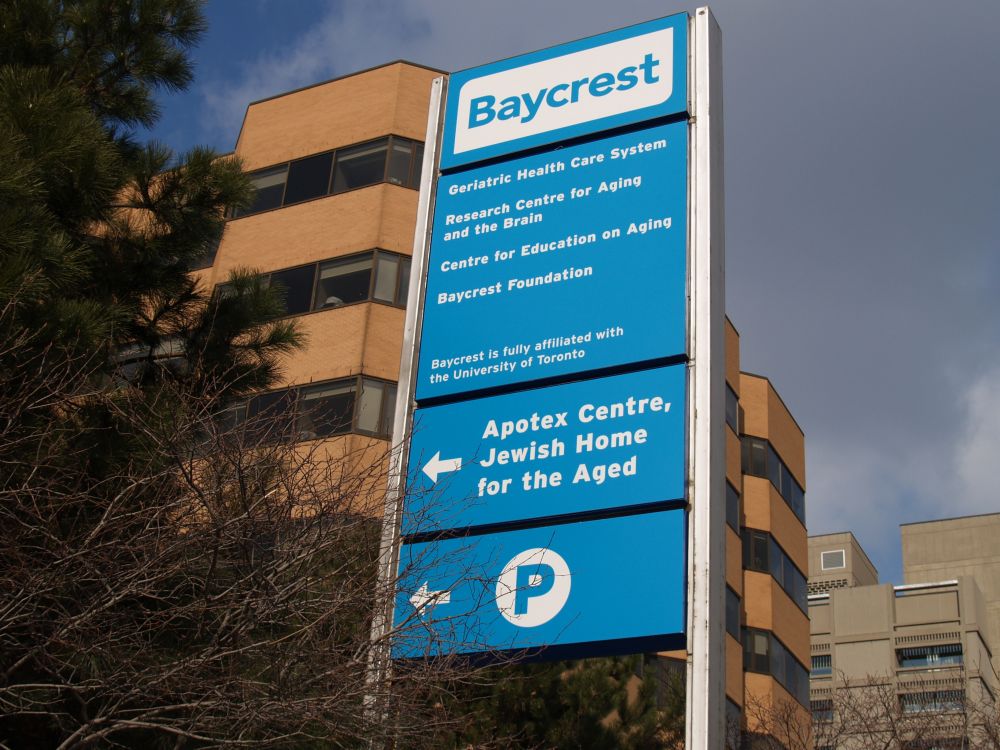 Baycrest is a leading facility in the care and treatment of the aging population. It is also a leading facility in the research of brain health during aging. Consequently the team of qualified experimental and clinical researchers that has been assembled from the Rotman Research Institute, Baycrest, and the University of Toronto represents world-class expertise and knowledge on brain health and aging. Together, the facility and the team will be able to provide a comprehensive, state-of the-art, examination of brain health in professional athletes.
Baycrest is a leading facility in the care and treatment of the aging population. It is also a leading facility in the research of brain health during aging. Consequently the team of qualified experimental and clinical researchers that has been assembled from the Rotman Research Institute, Baycrest, and the University of Toronto represents world-class expertise and knowledge on brain health and aging. Together, the facility and the team will be able to provide a comprehensive, state-of the-art, examination of brain health in professional athletes.
Our Team
Dr. Brian Levine, a registered clinical neuropsychologist, is a senior scientist at the Rotman Research Institute at Baycrest and professor of Psychology and Medicine (Neurology) at the University of Toronto. Dr. Levine is the principal investigator of this study. His expertise is in cognitive testing, memory, neuroimaging, dementia, and traumatic brain injury. Click here for Dr. Levine's Lab page.
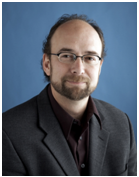 Dr. A. Randall McIntosh is a neuroscientist, the Director of the Rotman Research Institute, Vice President of Research at the Baycrest Centre, and a Professor in Psychology at the University of Toronto. Dr. McIntosh is an expert in neuroimaging methods and analyses. Click here for Dr. McIntosh's Lab page.
Dr. A. Randall McIntosh is a neuroscientist, the Director of the Rotman Research Institute, Vice President of Research at the Baycrest Centre, and a Professor in Psychology at the University of Toronto. Dr. McIntosh is an expert in neuroimaging methods and analyses. Click here for Dr. McIntosh's Lab page.
 Dr. Tiffany Chow is a neurologist, senior scientist at the Rotman Research Institute at Baycrest, and Assistant Professor of Neurology and Psychiatry in Department of Medicine at the University of Toronto. Dr. Chow is an expert in the field of dementia. Click here for Dr. Chows's Lab page.
Dr. Tiffany Chow is a neurologist, senior scientist at the Rotman Research Institute at Baycrest, and Assistant Professor of Neurology and Psychiatry in Department of Medicine at the University of Toronto. Dr. Chow is an expert in the field of dementia. Click here for Dr. Chows's Lab page.

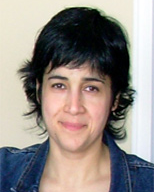 Dr. Lili-Naz Hazrati is a neuropathalogist in the Pathology Department at the Toronto General Hospital. Dr. Hazrati is an expert in the field of neurodegeneration and aging. Click here for Dr. Hazrati's Lab page.
Dr. Lili-Naz Hazrati is a neuropathalogist in the Pathology Department at the Toronto General Hospital. Dr. Hazrati is an expert in the field of neurodegeneration and aging. Click here for Dr. Hazrati's Lab page.
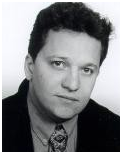 Dr. Daniel Mueller is a psychiatrist and the Head of the Pharmacogenetics Research Clinic and Staff Psychiatrist at the Centre for Addiction and Mental Health. Dr. Meuller is an expert in the field of genetics and mental illness. Click here for Dr. Mueller's Lab page.
Dr. Daniel Mueller is a psychiatrist and the Head of the Pharmacogenetics Research Clinic and Staff Psychiatrist at the Centre for Addiction and Mental Health. Dr. Meuller is an expert in the field of genetics and mental illness. Click here for Dr. Mueller's Lab page.
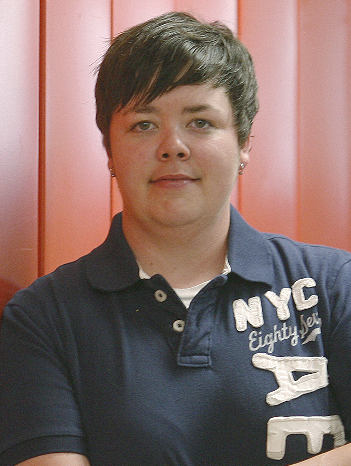 Dr. Carrie Esopenko is a postdoctoral fellow at the Rotman Research Institute at Baycrest. Her research focus is on the long-term effects of sports-related concussions in professional athletes. Click here for Dr. Esopenko's webpage.
Dr. Carrie Esopenko is a postdoctoral fellow at the Rotman Research Institute at Baycrest. Her research focus is on the long-term effects of sports-related concussions in professional athletes. Click here for Dr. Esopenko's webpage.
Dr. James Kennedy is a psychiatrist and Director of the Neuroscience Research Department and Head of the Psychiatric Neurogenetics Section at the Centre for Addiction and Mental Health. Dr. Kennedy is an expert in the field of genetics and mental illness. Click here for Dr. Kennedy's page.
Ms. Aggie Bacopulos is a research assistant for Dr. Levine. She assesses participants using neuropsychological measures and functional neuroimaging, with a focus on diffuse brain injury.
Frequently Asked Questions
1) When will I participate?
appointments. If you have any questions or concerns in the meantime, please contact Aggie Bacopulos at 416-785-2500 x3100. In order to accommodate the demand, assessment scheduling will be spaced out over the year. Alumni local to Toronto will be accomodated before those from other locations. Please be patient if a slot is not available for you immediately.
2) How are appointments booked?
book an appointment time that works best for you. Some components of our study can
be completed on different days, so you will have the option of completing the study
over multiple appointments.
3) What if I am not from Toronto?
Yes. We are very eager to test all alumni. We need to test as many former players as possible, with as much diversity as possible, to ensure the most valid research results. This includes players from every position, as well as players who had both short and long careers.
5 ) I am only recently retired from the NHL, or I have just graduated from University. Should I wait until I am older to participate?
No. By participating now, you will be eligible for the longitudinal element of the study, where you will be tested every three years for any changes in brain function. Furthermore, by participating now, you will serve as a younger comparison subject to older alumni.
6) Do I have to participate in all components of the study?
7) Who will have access to my personal information?
8) What if I am claustrophobic and not comfortable with having an MRI?
9) What if I have metal implants and want to participate in the MRI?
10) What if I don’t have any implants, but have been working with metal?
11) How can other retired NHL players and University alumni, who haven’t been contacted, participate in the study?
12) Can people who were not high-level athletes participate in this study?
13) Do comparison participants (volunteers who are not NHL or University alumni) get treated the same as alumni?
14) Can I get results from this study?
15) If I participate in this study and develop a health condition later, will my doctors be able to access the study data?
16) What if a problem is found on the MRI scan?
17) What is your position on the controversies surrounding head injuries in hockey that have been in the media?
18) Who is funding this study?
19) Will the findings be screened or censored by any agency?
We are independent and unbiased in our research methods and reporting. As part of the scientific method, our research findings will be reviewed by anonymous peers before publication.
20) Are there any long-term effects associated with the collection of cerebral spinal fluid (CSF; also referred to as a spinal tap)?
Typically, there are no long-term effects of CSF collection. Very rarely, one may experience a headache following the procedure. However, to reduce the likelihood of a headache, we take a number of precautions to make the procedure as comfortable as possible for our participants.
The procedure is performed by a certified neurologist and participants are carefully monitored during and immediately after the procedure to ensure that no side effects result.
Contact Us:
3560 Bathurst StreetToronto, Ontario
Canada M6A 2E1
Phone: (416) 785-2500
Baycrest is an academic health sciences centre fully affiliated with the University of Toronto
Privacy Statement - Disclaimer - © 1989-2024 BAYCREST HEALTH SCIENCE. ALL RIGHTS RESERVED


